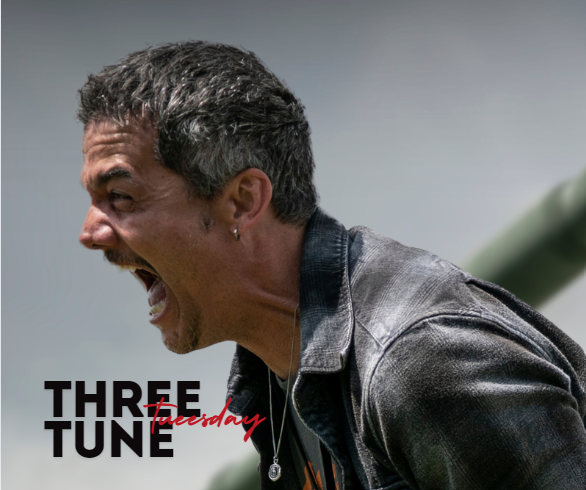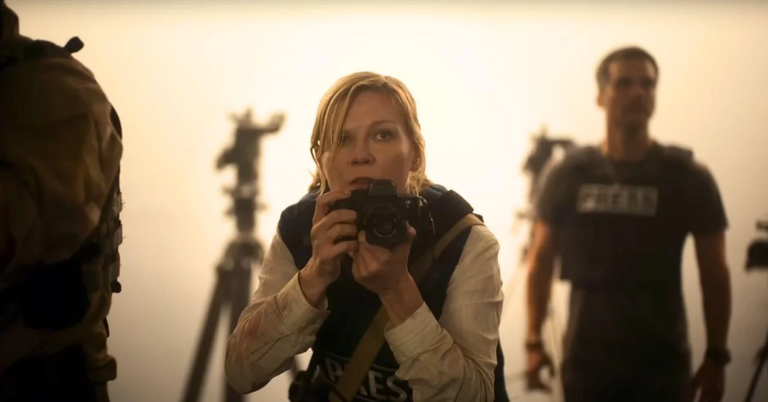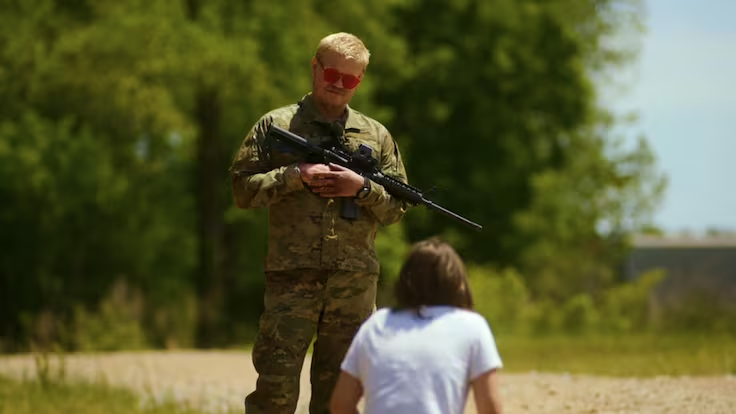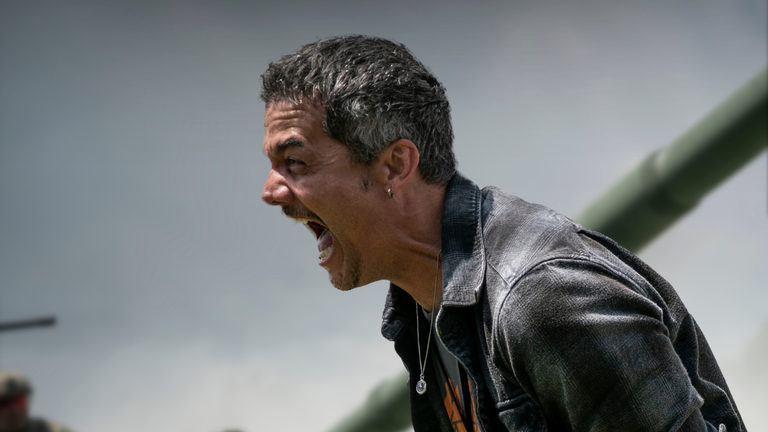Civil War

First off, in this fusion #threetunetuesday cross movie review ramble, I have been an Alex Garland fan since he wrote 'The Beach'. Published in '96, it finds it's dog eared way to backpacker bookshelves and op shops everywhere, such was its popularity. Like Shantaram, it was a good read for travelers, exploring themes of utopian island paradises in contrast to the dark side of human nature. Finding a secret idyll on a hidden island, a young British backpacker joins a community of likeminded travelers living there, but then face conflicts with locals, power struggles and the harsh realities of isolation. Garland's novel is a commentary on how we idealize paradise and how human desires can be destructive. I wouldn't class it as excellent literature, but it was a great read at the time.
Garland also wrote the script for 28 Days Later, a 2002 zombie film with a fantastic opening sequence where Cillian Murphy wakes in a hospital and finds himself in a post apocalyptic nightmare where fast moving zombies - that is, rage infected humans - destroy the fragile fabric of civilisation. If you know me at all, you'll know I'm a fan of a good zombie film.
It was zombie films I was thinking of as I watched 'Civil War', unaware that Garland directed it. The setting wasn't a landscape of zombie destruction, but equally post apocalyptic, and rife with human beings that had lost their soul or were in the process of losing it.

Kirsten Dunst as traumatised war photographerImage Source
The pace is set, in my opinion, with this song by Suicide. If there's ever a song that says 'post apocalypse' it's this one. It has this slow, ominous, minimalist and unsettling tone - a droning, repetitive, rolling rhythm and a pulsing beat that sets the mood for the pace of the cross country road trip across war torn America. The vocals are equally detached, menacing and echoey, and the bleak, foreboding and desolate landscape of the song is tone perfect with the dystopia of the film. Since this post is also for @ablaze's #threetunetuesday, it's worth including the lyrics as well:
Rocket rocket USA
Shooting on down the highway
TV star riding aorund
Riding around in a killer's car
It's nineteen seventy seven
Whole country's doing a fix
It's doomsday doomsday
Riding around, riding high
Riding around with my babe
Speeding on down the skyway
Speeding on down the skyway
Rocket rocket USA
Shooting on down
On my way
TV star riding around
Riding around in a killer's car
It's doomsday doomsday
Speeding on down the skyway
One hundred miles per hour
Gonna crash
Gonna die
And I don't care
Rocket rocket USA
Shooting on down the skyway
Speeding on down the skyway
Rocket rocket USA
Critics of the film worried at the backstory and were skeptical about the politic alliances in the film - understandably, a Texas-Californian Front is about as far-fetched as it gets. There's no real exposition of how America got to this point of civil war, which disgruntles some viewers. But the ambiguity works - it's not so much about how America got this way, but the realities of war itself. Like 'The Beach' and '28 Days Later', 'Civil War' looks at the dark side of human nature, and just what we are capable of. There's some harrowing scenes both in the war reporter Kirsten Dunst's flashbacks of photographing scenes of horrific violence, and in the frenetic heat of their road trip to interview the president - mass graves, executions, senseless murders.

Jess Plemons asking 'where in America' are you from. Image Source
Besides, the film is definitely not entirely apolitical - there's certainly a stance made about totalitarian dictators, fascism, white nationalism. It's just that the political ties Garland makes are unbelievable, which creates a little distance between the immediate political landscape now and the world of the film.
The film also asks the viewer about their reaction to scenes of violence. At first, we feel uncomfortable. It's hard not to be - the subjects stare at the frame as they burn and are snapped by the camera lens. Just as the photographers insert themselves alongside combatants, the viewer is asked to stare into the abyss and steel themselves against the brutality. By the time the film ends, we are somewhat desensitised, though hopefully the final image will rattle us enough. This is not at all unlike how we watch the horror on our screens from afar. We see Palestinian hospitals bombed, cry, and then go about our day. We steel ourselves against the horror show. We scroll by. We stop caring. One can only imagine what it's like to be a war photographer that can only survival if they are able to desensitise themselves.

The scenes where Wagna Moura rages against the horror in Civil War and drinks to anaesthesize are some of my favourite, but perhaps that's just the eye candy.Image Source
Not only that, but the photographers watching it show how war photographers are meant to be impartial, though it's often hard to to be. They're meant to remain distant, to capture the raw that might be unnoticed if there is no one to document it. It's impossible, of course, to remain unbiased - one scene has their safety threatened on the edge of a mass grave overseen by a racist in rose coloured glasses. It's impossible for us not to take a position here. How can anyone be okay with such atrocity, no matter the politics?
If you appreciate photography, you'll also appreciate this film - how shots are composed, the difficulty of capturing violence and chaos on camera. It's definitely a film about photojournalism. Still shots can be made from almost any scene in the film, and sometimes are, demonstrating the art of composition and the manipulation of viewer emotion in the chosen frames. If you've read Scott Anderson's 'Triage' you'll understand the psychology of war photography - there's a distance needed to walk amongst the scenes of carnage and capture something that can send a message to the world or at least bear witness to the atrocity, but there's also the fact no war photographer is unscathed psychologically.
The music and sound in this film was really enjoyable - not just the tunes but where they are placed, and the silences, such as the auditory post explosion sound vacuum or the sound of birds and the wind as snipers crawl in wet and beflowered grass. At times the music feels incongruous, adding to the feelings of discomfort and discombobulation - the upbeat 'De La Soul' as prisoners are being executed reminds me of other war films where similarly sugary songs contrast appallingly with the visceral horror of what's going on. It's a disturbing juxtaposition that emphasizes the callous senselessness of the scene.
It also ends with this song by Suicide. I don't want to talk about the ending, but you'll listen to this as the credits roll with the last photograph showing just how mental things can get. I love this song - it's in my 'Songs I Like' list in Spotify - and it works as a hauntingly beautiful end to the film.
I read somewhere that Garland's taking a break from directing. When - if ever - he decides to come back, I'm in.
With Love,

Are you on HIVE yet? Earn for writing! Referral link for FREE account here
Congratulations @riverflows! You have completed the following achievement on the Hive blockchain And have been rewarded with New badge(s)
Your next target is to reach 2100 posts.
You can view your badges on your board and compare yourself to others in the Ranking
If you no longer want to receive notifications, reply to this comment with the word
STOPWas beginning to think so.
Seems like my assumption was wrong. 😎
I know, it's utterly incongruous... but it fits, if you think about it. If there's an apocalyse, I get to stay at home and grow veggies.
Good point. It's comforting to know that power can be generated by my wind generator which has not been yet installed the Makina. It gives me comfort when the concept of a nuclear winter, which may block the sun, is brought up. There will likely be wind still. 🤪
Ha, well, if you can grow veggies under grow lights then you might just survive a nuclear winter.
Suicide is great. I recently picked up an album by Martin Rev. The one who did all the music in that band. It's from the early 80s, so it doesn't sound too far off from the early suicide stuff
https://m.youtube.com/playlist?list=OLAK5uy_nmsvhV1A7kaoStSknwg5DeWY0aA-3W64U&playnext=1&index=1
Oh awesome, I'll give it a listen!
I wasn't impressed by the film.
It had some interesting moments, but the characters were largely unlikable.
For a film with the journalists as the protagonists; I wondered if they realized how unlikable they came across to many who watched it.
I thought they had very realistic environment/design for much of the movie.
The crashed helicopter, the camp at the stadium, and the road with disabled vehicles.
The camera used to film this movie was very interesting as it's not a traditional cinema camera, but a DJI Ronin 8k that's considered extremely affordable.
The Ronin gave Garland a lot of versatility at very affordable price(relative to other brands of camera) so they could spend more elsewhere. This was A24's most expensive film so far.
I thought the Washington DC section looked the weakest, by far.
I'm a huge fan of Garland's films for a long time now.
I was curious about the political stance the film would take, and it was pretty expected. The president was clearly an analog for Trump, and the gas-station scene held plenty of contempt and showed the "right-wingers" as evil and crazy for protecting their business. To do that, they added torture, which is typical.
It took the "people are more valuable than property" stance which is one of compassion, but lacks any compassion for the person who would be the victim of the one stealing from them. They aren't killing for fun, but refusing to be victims.
A lot of people today have this idea of compassion, but their compassion is a weapon against people who they disagree with politically, socially, etc.
They have no compassion for them.
I THINK the film was drastically re-written by the studio as they saw the reactions to it online. They quickly realized that a lot of people weren't as on-board with the concept of the movie as they thought, and toned it down politically IMO.
Garland in interviews nearing it's release seemed very unhappy with directing the film, and said he was thinking of taking a break. I think this was because of the studio second-guessing him, and demanding changes to it.
I could be wrong.
All in all, the final message of the film seems kind of vague.
I think they should have just leaned into, and made it more action-packed or graphic.
Because right-wingers love good art even when they know it's made against them.
At least I know I do.
On the contrary lots of right-wing art is made terribly, and they embrace it on it's messaging. But lots don't as well, and I'd be one of them.
When they say "the left can't meme" they're ignorant of 50 years of Hollywood, video-games, and television.
The left meme's too well, and that's how they became the establishment rather than the counter-culture. The problem is that they haven't realized this reversal took place. I realize it because I was always on the left, and always saw the right/conservatives as the establishment. They no longer are.